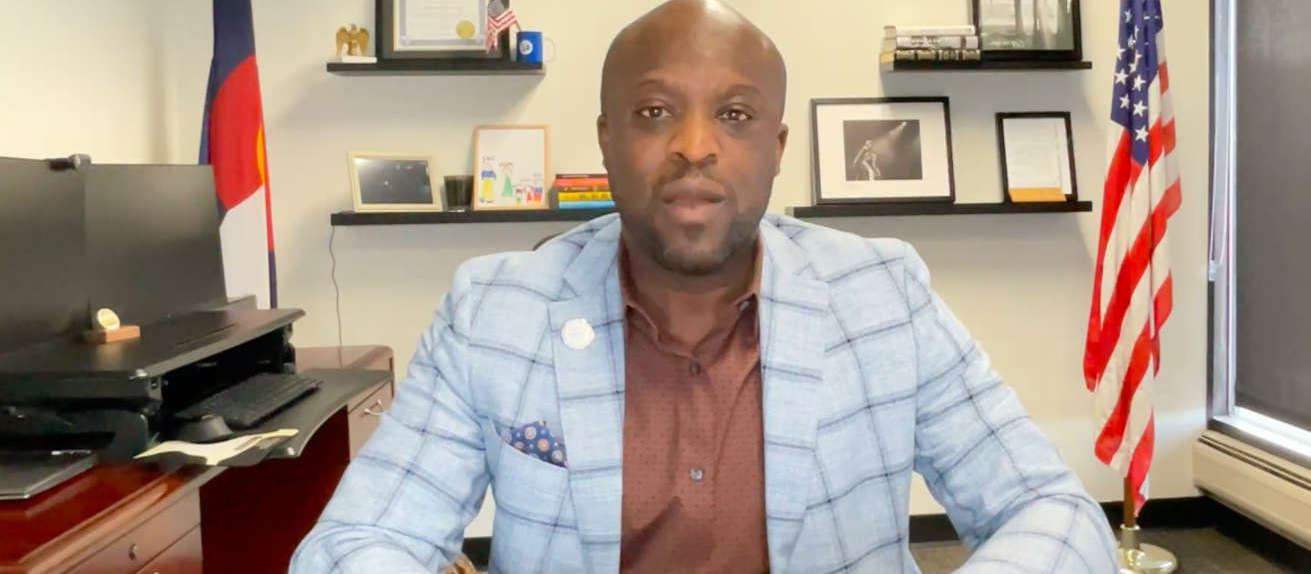Colorado Springs Mayor Yemi Mobolade attempted to calm concerns about migrants arriving in Colorado Springs during a Facebook livestream today.
“Join me in de-escalating the situation because we’re not in crisis mode,” said Mobolade. “Twenty-one families [arrived in Colorado Springs]. Denver is dealing with 40,000 families. They’re in crisis. I just want to make sure that we are ready if indeed that crisis ends up meeting our city.”
This week the Salvation Army offered assistance to migrant families that arrived in Colorado Springs. In response, the El Paso County Board of Commissioners and Colorado Springs City Councilor Dave Donelson held a press conference Wednesday to oppose offering aid to migrants.
“I urge our nonprofit community and partners to refrain from welcoming this crisis by welcoming migrants,” said Commissioner Carrie Geitner, who last summer pushed the board to deny a $20,750 Community Development Block Grant to The PLACE, a nonprofit that helps youth exit homelessness. “Keep going. Do not stop here in El Paso County. We will not shelter.”

In May, Commissioner Longinos Gonzalez warned about the dangers posed by migrants during an appearance on the Richard Randall Show. “The issue that really stands out to me is the public safety [issue], long-term, with some of the drug traffickers utilizing [migrants],” he said. “Some are criminals. Some are good people that are illegally in our country. But the criminal elements, traffickers in Mexico will absolutely use this to their benefit. And that’s what scares me.”
In 2019, the Cato Institute, a conservative think tank, noted that the majority of drug trafficking arrests — 77% — involve U.S. citizens. “According to data from the U.S. Sentencing Commission, U.S. citizens had 77 percent of federal drug trafficking convictions in 2018,” notes the Cato Institute. “This percentage has grown from 69 percent in 2012. The share of drug traffickers who were illegal immigrants fell from 21 percent in 2012 to 16 percent in 2018.”
Mobolade said he is taking steps to ensure Colorado Springs is prepared to deal with the situation. “What I’ve done is to activate our Pikes Peak Office of Emergency Management to start to plan out different kinds of scenarios,” he said. “Because we have to be proactive. We have to think ahead in terms of different type of scenarios that meet our city. Are we ready? How do we prioritize our residents? Do we have an idea of even the resources that are available to us? Because as a city government, we’re typically not in a humanitarian space. And so we have to depend on our partners such as the El Paso [County] Department of Human Services and Public Health and many of these agencies that receive federal funding.”
Like the mayors of Chicago, Denver, Houston, Los Angeles and New York, Mobolade implored President Joe Biden to manage the surge of migrants. “Immigration is a federal responsibility,” he said. “It’s not in the city’s purview, but because we have not taken care of the crisis in the U.S. southern border, it’s made it to our city. I do call on the President of the United States and our federal partners to help us to ensure that this crisis doesn’t impact our city.”
Denver Mayor Mike Johnston says Denver is having to foot an annual bill of $180 million for migrant services, which would lead to major cuts in other city budgets.
“It’s really important to me that I am a careful stewards of our parks, our taxpayer dollars,” said Mobolade. “Therefore, it is not my intent that we would have a crisis or adopt a crisis or invite a crisis into our city. It’s also not my intent that we become a sanctuary city. That is not what I signed up for as mayor. That has a lot of implications. It’s also important that it is my duty to care for our residents first.”
Mobolade also mentioned the difficulties of navigating the U.S. immigration process. “I’m an immigrant myself,” he said. “I am the product of the American dream, and I love this country. I moved it because it’s a land of opportunity. I wanted opportunity, and that’s why I came. That’s been provided to me. One of the reasons I ran for office is to give back to the land that gave me so much. And so those are questions I am asked, these days, ‘Yemi, you’re immigrant with a migrant crisis. What does that mean for you?’ I know I can’t speak for the migrants in the southern border, but if I was to guess, they’re also coming here for opportunity. Now, our stories are very different. I came in through the more traditional way, the immigration story, going through the proper channels and the right paperwork. It took me 21 years even to be able to vote, and now to have the opportunity to run for office. So I went through this process the more legal way, and many of our minors that are coming here are also looking for opportunity. And there’s probably some legal ways that they’re coming to the border, but I can’t really speak to that. What I do know is that these families are looking for opportunity, and hence the federal government needs to step up to ensure that that they’re taking care of, we’re not just taking care of the border crisis, but perhaps we can be proactive also in helping these families that are looking for help and opportunity.”




